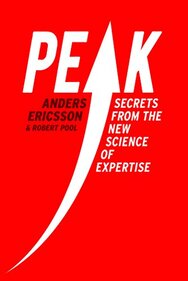
What's it About?
What are the key points?
However, Ericsson is quick to point out that not all practice is the same, a much misunderstood idea. The gold standard is deliberate practice, standing at the opposite end of the spectrum from naive practice, with purposeful practice between them. Naive practice is what a lot of people might confuse for practice; that is, time just spent doing an activity. Examples could be the time we spend driving a car or playing a sport socially. Because we put the time in it feels like we should be getting better, almost by default. Unfortunately, this is not the case. Indeed, there are certain examples of this where skill may actually deteriorate over time as we become lazy or develop bad habits. Instead, practice has to have some additional features to it to allow one to develop steadily over time. Purposeful practice is the next step along this dimension and is typified by some notable characteristics: there is a clearly defined goal in mind, there will be focused adjustments of the skill towards this goal, and there will be feedback about the effectiveness of such adjustments. Also, the difficulty of practice will be in a sweet spot of being beyond the comfort zone of the individual but still achievable. All these features will result in a steady improvement towards the desired goal. However, some domains are also amenable to what Ericsson terms “deliberate practice”- the most effective form of training. This is seen in some of the skills that have been around for a long time with a well established tradition of training, clear objective outcomes, a competitive drive amongst trainees and a cohort of trainers who were/are experts themselves. A good example of this could be ballet, or proficiency at a classical musical instrument. In deliberate practice, a skilled teacher will be able to guide the trainee through their training, in many ways similar to purposeful practice but with the benefit of their own deep rooted expertise of the domain to hone the appropriate exercises and feedback.
Ericsson describes that the key underpinning reasons for the effectiveness of this training lies within the idea of mental representations. Experts are as good as they are because they have the best mental representations. These are the psychological models for the skill in question, and likely represent numerous models within models. Indeed, our limited working memory means that we can only hold a few models within our mental workspace at any one time. The expert has honed these models over years of practice to make them incredibly efficient as well as powerful. A tennis professional can integrate huge amounts of information about the flight of a ball, the position of himself and the opponent on the court, and the opponents abilities, all within the fraction of a second that the ball is crossing the court. An amateur may have to focus on making contact with the ball, think about his foot positioning and also be thinking about his opponent's court position - an amount of cognitive processing that one can not effectively process actively. Experts, in contrast, have excellent automatic processing of information that they are able to keep under close active review with their free cognitive bandwidth.
One final crucial insight that Ericsson provides is the dismantling of the myth of talent. Ericsson describes his detailed exploration of this myth over his years of research. This has included a detailed look at the many prodigies that have been lauded through history, from Mozart through to world class athletes. Despite some of their incredible abilities, he still finds the same story behind their success. They have become so good after many years of intense practice within that field, with no examples that he can find of this not being the case. He does concede that there can be a genetic influence in some abilities, and these are the most clear in cases where physical attributes give a definite advantage (it’s hard to be a short basketball star). There may also be certain difficult to assess traits that would make someone more inclined towards effective deliberate practice (for instance, some genetic predisposition towards concentration or the like). However, whatever your starting genes, you cannot become an expert without putting in the hard work of repeated deliberate practice and it seems to be the practice that is the main determinator for the end result. This seems both empowering and a touch daunting. On one hand it hands us all the potential to become incredible at almost anything that we would wish to pursue. On the other hand it reminds us that this is a very challenging path to walk. Indeed, Ericsson deconstructs the notion that you can just put in the 10,000 hours of time that was popularised by Malcolm Gladwell on the topic. Instead this time (plus or minus a few thousand hours, depending on the expertise desired) has to be spent undertaking a high degree of cognitive effort that is usually at least a bit unpleasant to do. There is nothing passive about becoming an expert.
Final Thoughts
Thank you for reading and, as always, I would love to hear your thoughts on the topic.
Tom
Links & References
- K. A. Ericsson, R. Poole. Peak. Random House. 2016
- Chambliss, D. The Mundanity of Excellence. 1989. https://academics.hamilton.edu/documents/themundanityofexcellence.pdf
 RSS Feed
RSS Feed
